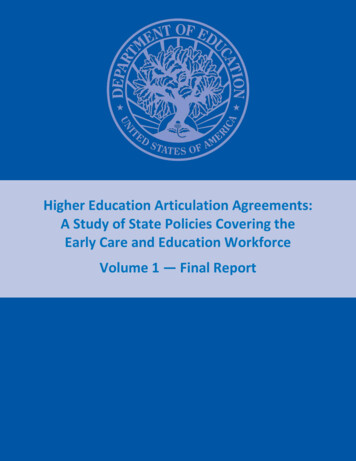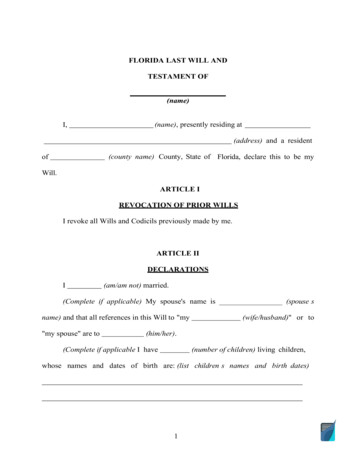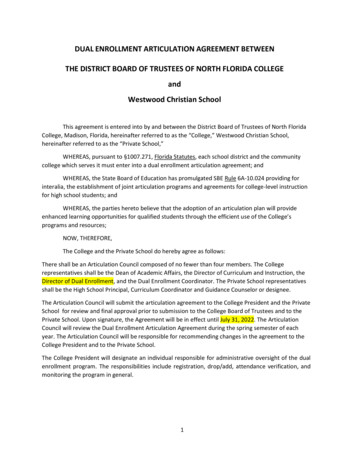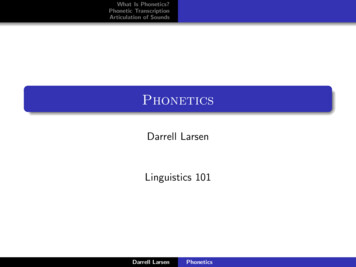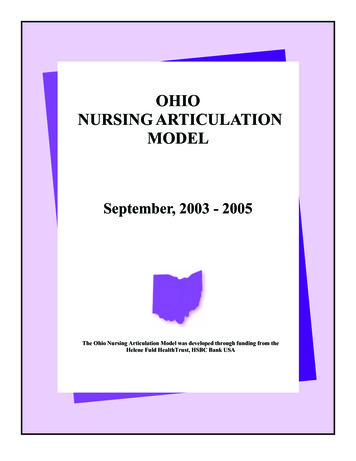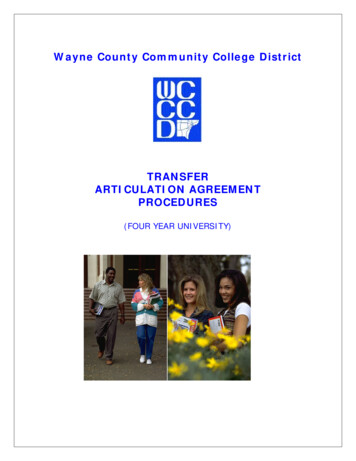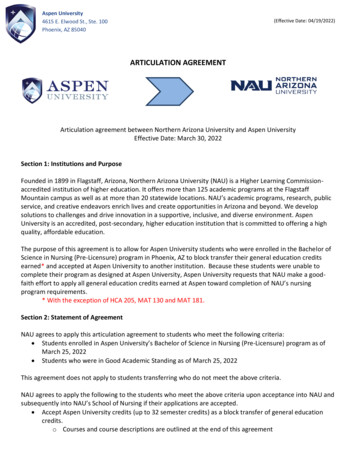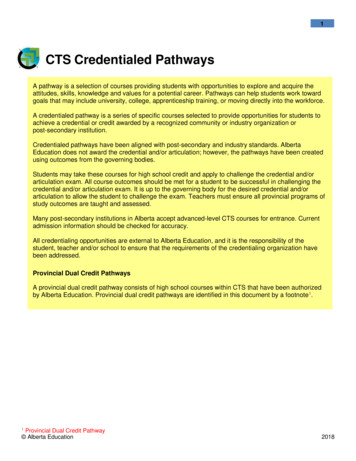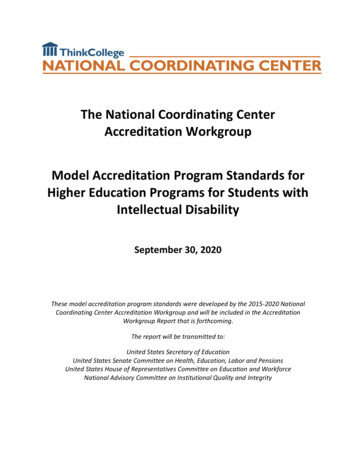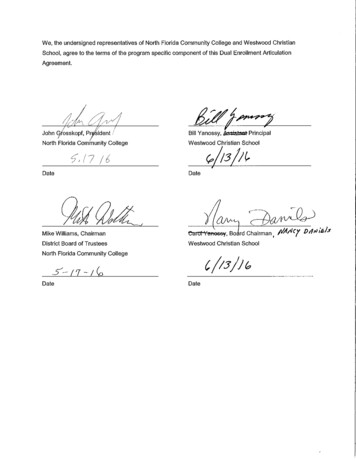
Transcription
Articulation Coordinating CommitteeAgendaApril 18, 2012Valencia College, West Campus1800 S. Kirkman Road, Orlando, Florida9:00 – 11:30 a.m.Postsecondary Transition Standing CommitteeBldg. 6 (Library), Room 2021:00 – 4:30 p.m.Articulation Coordinating CommitteeBldg. 6 (Library), Room 2021. Chairperson’s WelcomeDr. Ed Massey2. Approval of December 8, 2011 MeetingMinutes (conference call)Dr. Ed MasseyAction Item3. Approval of Common Prerequisite ProgramMs. Abbey CunninghamChanges4. Approval of 2012‐2013 Dual EnrollmentCourse‐High School Subject AreaEquivalency ListMr. Matthew BouckDiscussion Items5. Credit‐by‐Examination: AP StudentPerformance in Subsequent CourseworkMr. Matthew Bouck6. 2012 LegislationMr. Matthew Bouck7. Proposed 2012‐2013 ACC ActivitiesMr. Matthew Bouck8. Presentation: American Honors CollegeMr. Phil BronnerThe next ACC meeting is scheduled for October 24, 2012
Articulation Coordinating CommitteeMeeting MinutesDecember 8, 2011A meeting of the Articulation Coordinating Committee (ACC) was held via conference call on Thursday,December 8, 2011, from 10:00 a.m. to 12:00 p.m.Welcome and IntroductionsMembers Present Dr. Walter Christy, Brevard County SchoolsDr. Rosa Jones, Florida International UniversityDr. Ed Massey, Indian River State CollegeDr. David Persky, St. Leo University (represented by Madeline Hollon, ICUF)Mr. Ted Stratton, Florida Gubernatorial Fellow, Florida College SystemDr. Betty Tilton, Keiser UniversityDr. Tony Waldrop, University of Central FloridaDr. Falecia Williams, Valencia CollegeMr. Matthew Bouck, Office of Articulation, StaffACC History and Mr. Matthew Bouck described the process re-establishing the Articulation CoordinatingCommittee into Florida Statute in 2011. The statute made changes to the ACC membershipDutiesand reporting structure. Each sector was asked to make recommendations to fill the requiredpositions: two members each representing the State Un1iversity System, the Florida CollegeSystem, public career and technical education, public K-12 education, nonpublic education,and one member representing students. Matthew Bouck briefly described the history of theArticulation Coordinating Committee since the early 1970s and its statutory membership andduties.Chancellor Frank Brogan of the State University System was invited to make comments aboutthe role of the ACC and its relationship to the Higher Education Coordinating Council.Chancellor Brogan described the broad scope of the HECC and the necessity to move beyondstaff analysis to seek guidance and recommendations from around the state on a host of majorissues. An existing resource for this type of activity is the ACC. Consequently, the HECCasked that the ACC consider itself as an ‗arm‘ of the HECC to provide expertise in a range ofarticulation issues. This relationship is fortified in the reporting structure of the ACC.Chancellor Brogan then described the role of the HECC in the preK-20 system of education.The HECC is tasked with making recommendations to facilitate a seamless system ofeducation in Florida and to ensure cooperation in the creation of a viable talent supply chainamong all delivery systems. The HECC is currently working on a document for theLegislature addressing several key areas; the HECC will utilize the services of the ACC for across-representative look at these issues.Action ItemsGold StandardCareer PathwaysArticulationAgreementsJohn McNeely from the Division of Career and Adult Education presented 14 new GoldStandard Career Pathway Industry Certification Articulation Agreements. Mr. McNeelydescribed the history of these agreements (since 2008 there have been 102 of these agreementsapproved), and the process by which these articulation agreements are created and reviewed.The following 14 agreements were submitted for discussion and approval:Industry Certification TitleArticulate to AAS/AS ProgramAutodesk Certified User - AutoCADDrafting and Design TechnologyAutodesk Certified User - AutoCADArchitectural Design and ConstructionTechnologyEngineering TechnologyAutodesk Certified User – AutodeskInventorArticulatedCredits3331
Certified Medical Assistant (CMA)Health Services Management3Registered Phlebotomy Technician(RPT)Biotechnician AssistantMedical Laboratory Technology3Biotechnology3Biotechnician AssistantBiotechnology Laboratory Technology3Certified Dental Assistant (CDA)Dental Assisting Technology andManagementAccounting Technology5Emergency Medical Services9Computer Programming and Analysis3Internet Services Technology3Internet Services Technology3Pharmacy Management9QuickBooks Certified UserEmergency Medical Technician –Basic (EMT)Certified Internet Web (CIW)JavaScript SpecialistCertified Internet Web (CIW) SiteDevelopment AssociateCertified Internet Web (CIW) WebDesign SpecialistCertified Pharmacy TechnicianUF YoungEntrepreneurs forLeadership &Sustainabilitydual enrollmentprogram3Dr. Massey moved approval of these agreements; Dr. Falecia Williams seconded the motion.The 14 Gold Standard Career Pathway Articulation Agreements were approved.Mr. Matthew Bouck described Section 1007.271(17), Florida Statutes, which gives theCommissioner of Education the authority to approve dual enrollment agreements that havestatewide appeal. There are four such dual enrollment agreements: Boys State and Girls State(TCC and FSU), Lou Frey Institute of Politics and Government—Civic Leadership Academy(UCF), Young Entrepreneurs for Leadership and Change (UF), and Student Science TrainingProgram (UF). The Young Entrepreneurs for Leadership and Change statewide dualenrollment program at the University of Florida was modified, requiring approval of a newagreement. The changes are as follows.1. Name change from "UF Young Entrepreneurs for Leadership & Change Summer Program"(YELC) to "UF Young Entrepreneurs for Leadership & Sustainability Summer Program"(YELS)2. GEB4930 course number changed to ENT4934, when all ―Entrepreneurship‖ courses at UFwere transitioned from GEB (general business) to ENT (entrepreneurship) prefixes—thecourse content, instructor, and materials remain unchanged.3. Language in the registration policy that can be omitted—there is no requirement forstudents to register for both courses, though in practice, they always have.YELC dual enrollment student shall not be permitted to enroll for only onecourse without enrolling in the other. YELC students must either enroll inboth GEB 4930 and SYG 2010 or neither of the courses.4. A required text is now in its 5th edition, the 4th is no longer available.Dr. Massey moved approval of the changes to this agreement; Dr. Rosa Jones seconded themotion. The UF Young Entrepreneurs for Leadership & Sustainability Summer Programarticulation agreement was approved.Discussion ItemsACC StandardOperatingProceduresThe ACC discussed organizational issues relating to meetings dates, standing committees, andselection of a committee chair.The ACC has typically met on the 4th Wednesday of February, May, and October. These dateswill carry forward into 2012 unless other circumstances require a change.2
There are several existing ACC Standing Committees: Oversight, Postsecondary Transition,Statewide Policies and Guidance, Statewide Residency, and FACTS.org. These committeeswill continue to function. The Statewide Residency Committee should add membership fromthe adult education and career and technical education sectors.The ACC discussed communication issues. Institution articulation officers or otherappropriate institution personnel should be more involved in the solicitation of ACC agendaitems and for dissemination of information about ACC activities; these issues will be evaluatedfor their statewide impact.HigherEducationCoordinatingCommitteeDr. Tony Waldrop nominated Dr. Ed Massey to continue to serve as chair; Dr. FaleciaWilliams seconded the nomination. The ACC approved Dr. Massey as chair of theArticulation Coordinating Committee. A discussion concerning a vice-chair will be held at thenext ACC meeting.Mr. Matthew Bouck described the activities of the Higher Education Coordinating Council. Areport to the Legislature is due December 31, 2011, concerning the primary mission ofpostsecondary institutions; performance outputs and outcomes; articulation policies; andworkforce education.Recommendations specific to the Articulation Coordinating Committee relate to generaleducation competencies, transfer student admissions and limited access, articulation andadvisement systems, Gordon Rule, common prerequisites, acceleration mechanisms, anduniversity admissions.Dr. Massey thanked the members and commented on the strength of the ACC and Florida’s system ofarticulation. The meeting adjourned at 12:00 p.m.3
Articulation Coordinating CommitteeApril 18, 2012Item #3Subject: Approval of Common Prerequisite Program ChangesProposed Committee ActionApproval of Recommended Common Prerequisite Program ChangesSupporting Documentation: Materials included in the packetPresenter: Ms. Abbey Cunningham
Florida College System Common Prerequisite Issues for ACC ConsiderationApril 2012ACTION ITEMS for Committee Approval – Existing CIPs13.1210, Track 2Pre-Elementary/ EarlyChildhood Teacher Ed –Birth through Age 413.1210, PROPOSEDnew Track 3Pre-Elementary/ EarlyChildhood Teacher Ed –Combined Age 3through Grade 3 andBirth through Age 409.0102Communication (Mass)11.1099TechnologyManagement13.1210, Track 1Pre-Elementary/EarlyChildhood Teacher Ed –Age 3 through Grade 343.0104Criminal Justice Studies44.0000Human Services51.3801, Track 2Nursing52.0201Business Administrationand Management52.0299Supervision andManagement52.1101International BusinessManagementFlorida Gateway College proposes two course alternatives: EEC 1309 Early Childhood Education Foundations as an alternative for EEC1000 Introduction to Early Childhood Education EEC 2949 Child Development Internship as an alternative for EEC 1319Portfolio Development and Supervised Work Experience*See attached draft page of the Common Prerequisite Manual with the proposedchanges highlighted in yellowMiami Dade College proposes a third track be added to the 13.1210 CIP that willencompass both Age 3 through Grade 3 (Track 1) and Birth through Age 4 (Track 2)curriculum. The proposed track includes the current Track 2 prerequisite courses aswell as three proposed course alternatives: EEC X407 Facilitating Social Development as an alternative for EEC X001 EarlyChildhood Growth and Development EEC X271 Working with Young Children with Special Needs and Their Familiesas an alternative for EEC X601 Observing and Recording Children’s Behavior EEC X224 Emergent Literacy through the use of Children’s Literature as analternative for EEC X319 Portfolio Development and Supervised WorkExperience*See attached draft page of the Common Prerequisite Manual for the proposed newtrackFYI AdditionsAdd Florida State College at Jacksonville – BS in Converged CommunicationsAdd State College of Florida, Manatee-Sarasota – BAS in Technology ManagementAdd St. Petersburg College – BS in Prekindergarten/Primary Education with InfusedESOL and ReadingAdd Indian River State College – BS in Criminal JusticeAdd Florida State College at Jacksonville – BS in Human ServicesAdd Santa Fe College – BS in NursingAdd Gulf Coast State College – BS in NursingAdd Indian River State College – BS in Business AdministrationAdd Lake-Sumter Community College – BAS in Organizational ManagementAdd Santa Fe College – BAS in Supervision and Organizational ManagementAdd South Florida Community College – BAS in Supervision and ManagementAdd State College of Florida, Manatee-Sarasota – BAS in International Business andTrade
FYI Technical Changes09.0102Communication (Mass)BAS Program CIPsMultiple CIPsMultiple CIPsEdit note to clarify that prerequisites must be outside of ENC and LIT prefix courses.*See attached draft page of the Common Prerequisite Manual with the proposedchanges highlighted in yellowEdit BAS note to remove extraneous language.*See attached draft page of the Common Prerequisite Manual with the proposedchanges highlighted in yellowChange SPC X016 to X017, or delete SPC X016 when both are included as alternatives.SPC X016 is no longer an active course in the Statewide Course Numbering System andwas transitioned to SPC X017.Change SPC X600 to X608, or delete SPC X600 when both are included as alternatives.SPC X600 is no longer an active course in the Statewide Course Numbering System andwas transitioned to SPC X608.
EXISTING CIP/TRACKProgram:Offered At:Pre-Elementary/Early Childhood teacher EdBirth through Age 4SCFMS, SFCFGCCIP:13.1210Track:2/3Program Length 120 Cr. Hrs.123REVISED XX/XX/XXLOWER LEVEL COURSESCr. Hrs.333333333AF&&&EDF 1005EDF 2085EME 2040EEC 1000 (1)orEEC 1309 (1)EEC 1001 (1)EEC 1601 (1)EEC 1319 (1)orEEC 2949 (1)T&&&NOTE: Completion of the FGC or SFC Bachelor of Science in Early ChildhoodEducation program does not result in educator certification.Course is not required by SFC.D(1)RFOR ALL MAJORS: Students are strongly encouraged to select required lowerdivision electives that will enhance their general education coursework and thatwill support their intended baccalaureate degree program. Students shouldconsult with an academic advisor in their major degree area.FOR EDUCATION MAJORS: General education courses will be determined bythe college or university where the student currently is earning the Associate inArts or baccalaureate degree, and will be published in the institution's existingcatalog and in the Community College Counseling Manual.Catalog Year 2012-13
NEW TRACKProgram:Offered At:Pre-Elementary/Early Childhood teacher EdAge 3 through Grade 3 and Birth through Age 4MDCCIP:13.1210Track:3/3Program Length 120 Cr. Hrs.REVISED XX/XX/XXLOWER LEVEL COURSESCr. Hrs.&3333333333AF&EDF 1005EDF 2085 (1)EME 2040EEC X000EEC X001orEEC X407EEC X601orEEC X271EEC X319orEEC X224T&&&&In addition to EDF 2085, a minimum of 6 hours with an international or diversityfocus is required. Eligible courses will be determined by the community collegeor university where the student is currently earning the Associate in Arts orbaccalaureate degree. Foreign language courses may be used to meet thisrequirement.D(1)RFOR ALL MAJORS: Students are strongly encouraged to select required lowerdivision electives that will enhance their general education coursework and thatwill support their intended baccalaureate degree program. Students shouldconsult with an academic advisor in their major degree area.FOR EDUCATION MAJORS: General education courses will be determined bythe college or university where the student currently is earning the Associate inArts or baccalaureate degree, and will be published in the institution's existingcatalog and in the Community College Counseling Manual.Catalog Year 2012-13
EXISTING CIP/TRACKProgram:Communication (Mass)Offered At:FGCU, FSCJ, UNF, UWF*FIU, USF*CIP:09.0102Track:1Program Length 120 Cr. Hrs.124REVISED XX/XX/XXLOWER LEVEL COURSESCr. Hrs.XXXXXXX (1)XXXXXXX (1)XXXXXXX (1)XXXXXXX (1)XXXXXXX (1)XXXXXXX (1)&&&&&333333(1)(1)Course outside of the major (ENC and LIT prefix courses) and beyond the 36hours of general education requirements. Please see the university if there arequestions.Course cannot include ENC and LIT prefix courses and must be beyond the 36hours of general education requirements. Questions should be directed to theinstitution.Limited Access.DR*AFTFOR ALL MAJORS: Students are strongly encouraged to select required lowerdivision electives that will enhance their general education coursework and thatwill support their intended baccalaureate degree program. Students shouldconsult with an academic advisor in their major degree area.Catalog Year 2012-13
EXISTING CIP/TRACKProgram:Health Services Administration (BAS)Offered At:SPCCIP:51.2211Track:1Program Length 120 Cr. Hrs.REVISED XX/XX/XXLOWER LEVEL COURSESCr. Hrs.NoneFOR ALL MAJORS: Students are strongly encouraged to select required lowerdivision electives that will enhance their general education coursework and thatwill support their intended baccalaureate degree program. Students shouldconsult with an academic advisor in their major degree area.DRAFTThe following is language approved by those colleges with BAS degreeprograms:Addmission to Bachelor of Applied Science (B.A.S) degree programs usuallyrequires an Associate in Science (A.S) or Associate in Applied Science (A.A.S)degree in a related area. If a student has earned an Associate in Arts (A.A.)degree, or an A.S. degree, an A.A.S. dgree, or its equivalent in an unrelatedarea, the student may be admitted on a case-by-case basis with approval of theappropriate academic administrator. Some majors may have licensure or othertypes of requirements prior to admittance. Due to the variance in specializedB.A.S degree programs and concentrations, students are strongly encouragedto consult with an academic advisor at the B.A.S. degree-granting institution.Catalog Year 2012-13
Articulation Coordinating CommitteeApril 18, 2012Item #4Subject: Approval of 2012‐2013 Dual Enrollment Course‐High School Subject AreaEquivalency ListProposed Committee ActionApproval of 2012‐2013 Dual Enrollment Course‐High School Subject Area Equivalency List2012‐2013 Additions:Successful completion of one of these dual enrollment college credit courses satisfies the high schoolgraduation requirement of one credit in fine arts. Each of these courses have been identified by acommittee of representatives from Career and Technical Education and Fine Arts as a practical artscourse that incorporates artistic content and techniques of creativity, interpretation, and imaginationrequired in Section 1003.428(2)(2)5, F.S.CGS X820C – Web Development and DesignDIG X000C ‐ Introduction to Digital MediaDIG X030C ‐ Digital Video and SoundDIG X100 ‐ Web Design IDIG X109C ‐ Digital Imaging FundamentalsDIG X284C ‐ Advanced Digital Video and Sound.DIG X292C ‐ Digital Post‐ProductionDIG X341C ‐ Motion Graphics for Digital MediaDIG X348C – Lighting Design and TechniquesDIG X430C ‐ Digital StorytellingDIG X500C ‐ Fundamentals of InteractiveDesign/Multimedia Authoring IDIG X940 – Practicum and PortfolioDevelopmentFSS 0228 ‐ Food ProductionFSS 0064 – Pastries and DessertsGRA X204 ‐ Digital Print ProductionGRA X206C ‐ Fundamentals of TypographyGRA X120C ‐ Page Design and LayoutGRA X156C ‐ Digital Design and IllustrationGRA X207C ‐ Advanced Image EditingVIC X301 ‐ Advanced Multimedia ComputerPresentationsSupporting Documentation: Materials included in the packetPresenter: Mr. Matthew Bouck
2012-2013 DUAL ENROLLMENT COURSE – HIGH SCHOOL SUBJECT AREAEQUIVALENCY LISTLast Update: April 2012ELECTIVESThis list should not be interpreted as the total number of dual enrollment courses available. Current lawallows for any course in the Statewide Course Numbering System, with the exception of remedial coursesand Physical Education skills courses, to be offered as dual enrollment. Three-credit (or equivalent)postsecondary courses taken through dual enrollment that are not listed below shall be awarded at least0.5 high school credits (postsecondary courses offered for fewer than three (3) credits may earn less than0.5 high school credit), either as an elective or subject area credit as designated in the localinterinstitutional articulation agreement.Note: Any upper-level (3000-4000) postsecondary course that uses as a prerequisite one of the courseson this list that are awarded 1.0 high school credit shall also receive 1.0 high school credit.Please note: PSY X012 “Introduction to Psychology” is also offered or accepted by all institutions as a part of theirgeneral education programs, but is a high school elective, and therefore not included on this list.ENGLISHPOSTSECONDARY COURSE COMPLETEDTHROUGH DUAL 22123133135141144145210300301302305321012Survey of American LiteratureIntroduction to American FolkloreAmerican Literature I: Colonial to The Civil WarAmerican Literature I: Colonial to 1875American Literature I: Colonial to 1900American Literature II: Civil War to PresentAmerican Literature II: 1875 to PresentAmerican Literature II: 1900 to PresentAmerican Literature: 1900 to the PresentModern American LiteratureModern American LiteratureSurvey of American LiteratureMajor American AuthorsStudies in Individual American AuthorsIssues in American Literature and CultureFreshman Composition Skills IFreshman Composition Skills IiAdvanced College WritingHonors Freshman Composition Skills IHonors Freshman Composition Skills IiHonors Introduction to WritingLibrary Research and WritingArgument and Persuasion (Non-Gordon)Writing About LiteratureFreshman Article and Essay WorkshopFreshman Special Topics CompositionTechnical Report WritingIntermediate CompositionAdvanced CompositionAdvanced Composition IiTopics in Advanced CompositionAdvanced CompositionApproaches To Literary CriticismHIGH 01.01.01.00.50.51.00.51.00.51.01.01.01.01.00.5** Indicates courses that all community colleges and universities offer or accept this course in transferas a part of their general education requirements.Page 1 of 32
HIGH TSECONDARY COURSE COMPLETEDTHROUGH DUAL 10118120122128British Literature Survey:ComprehensiveEnglish Literature to 1660English Literature to 1750English Literature to 1798English Literature since 1660English Literature since 1750English Literature since 1798Restoration and 18th Century LiteratureVictorian and Edwardian LiteratureModern British LiteratureContemporary British LiteratureWriting and GrammarEnglish Grammar and StyleIntroduction to LiteratureIntroduction to Modern LiteratureContemporary LiteratureWorld LiteratureWorld Literature through RenaissanceHonors World Literature IWorld Literature since RenaissanceGreat Books IHonors World Literature .50.50.50.50.51.01.00.51.01.01.01.01.01.0FOREIGN LANGUAGEFOREIGN LANGUAGE COURSES: All four-credit foreign language courses (including American SignLanguage), shall be awarded one full high school elective credit. Courses offered for three credits areawarded at least 0.5 high school elective credit.POSTSECONDARY COURSE COMPLETEDTHROUGH DUAL 0130131Beginning Amharic 1Beginning Amharic 2Intermediate Amharic 1Intermediate Amharic 2Beginning Akan IBeginning Akan 2Intermediate Akan 1Intermediate Akan 2Elementary Arabic IModern Arabic IElementary Arabic II ConcentratedElementary Arabic Accelerated IElementary Arabic Accelerated IIIntm Lang: Gen Rev Basic Skills IIntm Lang: Gen Rev Basic Skills IIIntermediate Arabic IIntermediate Arabic Reading And Conversation IIAmerican Sign Language IAmerican Sign Language IIAmerican Sign Language IIIAmerican Sign Language IIIHIGH SCHOOL GRADUATIONSUBJECT REQUIREMENTSATISFIEDElective: Foreign LanguageElective: Foreign LanguageElective: Foreign LanguageElective: Foreign LanguageElective: Foreign LanguageElective: Foreign LanguageElective: Foreign LanguageElective: Foreign LanguageElective: Foreign LanguageElective: Foreign LanguageElective: Foreign LanguageElective: Foreign LanguageElective: Foreign LanguageElective: Foreign LanguageElective: Foreign LanguageElective: Foreign LanguageElective: Foreign LanguageElective: Foreign LanguageElective: Foreign LanguageElective: Foreign LanguageElective: Foreign .50.51.01.01.01.01.00.50.51.01.00.50.50.50.5** Indicates courses that all community colleges and universities offer or accept this course in transferas a part of their general education requirements.Page 2 of 32
POSTSECONDARY COURSE COMPLETEDTHROUGH DUAL 231240241242243244100101Basic American Sign LanguageIntermediate American Sign LanguageAmerican Sign Language IIIAmerican Sign Language IIIAmerican Sign Language IVAmerican Sign Language IVAmerican Sign Language IVAmerican Sign Language IVElementary Aymara I, AcceleratedIntroduction to Catalan IIntroduction to Catalan IIIntermediate CatalanElementary Chinese IElementary Chinese I, ConcentrateElementary Chinese II, ConcentratedElementary Chinese Accelerated IElementary Chinese Accelerated IIIntermediate Chinese IIntermediate Chinese IISecond Year Chinese ConversationSecond Year Chinese ConversationIntermediate Chinese IIntermediate Chinese IIElementary Language IElementary Language IIElementary AcceleratedElementary AcceleratedIntermediate CzechIntermediate Czech 2Beginning Dutch IBeginning Dutch IIElementary French IElementary French IIElementary French I, ConcentratedElem French II, ConcentratedElementary French I AcceleratedElementary French II AcceleratedIntm Level: Gen Rev Basic Skills IIntm Level: Gen Rev Basic Skills IIIntermediate Conversation & Comp IIntm Reading And Conv Accelerated IIIntermediate Reading And ConversationInterm Reading And Conversation IIReading In French Literature & CultureIntermediate French Reading IIIntermediate Conversation IIntermediate French Conversation IIIntermediate French Conversation 1Intermediate French Conversation2Third Year French ConversationElementary German IElementary German IIHIGH SCHOOL GRADUATIONSUBJECT REQUIREMENTSATISFIEDElective: Foreign LanguageElective: Foreign LanguageElective: Foreign LanguageElective: Foreign LanguageElective: Foreign LanguageElective: Foreign LanguageElective: Foreign LanguageElective: Foreign LanguageElective: Foreign LanguageElective: Foreign LanguageElective: Foreign LanguageElective: Foreign LanguageElective: Foreign LanguageElective: Foreign LanguageElective: Foreign LanguageElective: Foreign LanguageElective: Foreign LanguageElective: Foreign LanguageElective: Foreign LanguageElective: Foreign LanguageElective: Foreign LanguageElective: Foreign LanguageElective: Foreign LanguageElective: Foreign LanguageElective: Foreign LanguageElective: Foreign LanguageElective: Foreign LanguageElective: Foreign LanguageElective: Foreign LanguageElective: Foreign LanguageElective: Foreign LanguageElective: Foreign LanguageElective: Foreign LanguageElective: Foreign LanguageElective: Foreign LanguageElective: Foreign LanguageElective: Foreign LanguageElective: Foreign LanguageElective: Foreign LanguageElective: Foreign LanguageElective: Foreign LanguageElective: Foreign LanguageElective: Foreign LanguageElective: Foreign LanguageElective: Foreign LanguageElective: Foreign LanguageElective: Foreign LanguageElective: Foreign LanguageElective: Foreign LanguageElective: Foreign LanguageElective: Foreign LanguageElective: Foreign 51.01.01.01.01.00.50.50.50.50.50.50.5** Indicates courses that all community colleges and universities offer or accept this course in transferas a part of their general education requirements.Page 3 of 32
POSTSECONDARY COURSE COMPLETEDTHROUGH DUAL 133200201220221222130131Elementary German 3Elementary Conversational GermanElementary Conversational German IIElementary German I, ConcentratedElementary German II, ConcentratedElementary German I-AcceleratedElementary German II-AcceleratedIntm Level: Gen Rev Basic Skills IIntm Level: Gen Rev Basic Skills IIIntermediate German I, AcceleratedIntermediate German Reading and Conversation 1Intermediate German Reading and Conversation IIIntermediate Conversation IElementary Greek I, ConcentratedElementary Greek II, ConcentratedElementary Greek I, AcceleratedElementary Greek II, AcceleratedNew Testament Greek INew Testament Greek IIIntermediate LanguageModern Greek Language IIElementary Modern Greek IElementary Modern Greek IIBeginning Modern Greek IBeginning Modern Greek IIIntm Level: Gen Rev Basic Skills IIntm Level: Gen Rev Basis Skills IIIntermediate Modern Greek Reading & Conversation IIntermediate Modern Greek Reading & Conversation IINew Testament Greek I - LowerReadings In New Testament Greek IElementary Haitian Creole I, ConcenElementary Haitian Creole II, ConcenBeginning Haitian Creole 1Beginning Haitian Creole 2Intermediate Haitian Creole IIntermediate Haitian CreoleBeginning HebrewBeginning HebrewElementary Hebrew IElementary Hebrew IIElementary Hebrew I, AcceleratedElementary Hebrew II, AcceleratedHebrew For Heritage Learners 1Hebrew For Heritage Learners 2Intm Lan
Add St. Petersburg College - BS in Prekindergarten/Primary Education with Infused ESOL and Reading 43.0104 Criminal Justice Studies Add Indian River State College - BS in Criminal Justice 44.0000 Human Services Add Florida State College at Jacksonville - BS in Human Services 51.3801, Track 2 Nursing Add Santa Fe College - BS in Nursing
